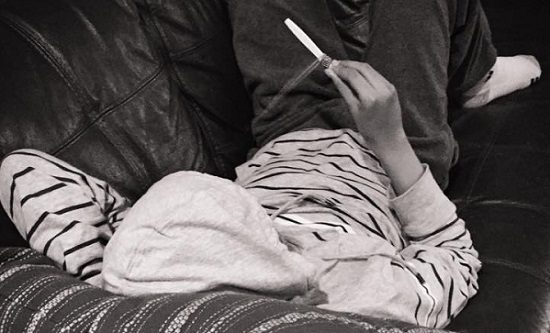
So how is he doing?
I pause at the question, put forth to me by D’s case worker. She and I meet four times a year to chat about D’s wellbeing, our challenges, what he needs, what he is struggling with, and what kind of supports he (and all of us) could use.
Yeah, he’s fine, I say. Then I pause. He’s fine is my stock response – my saying everything is ok, when in fact “ok” becomes such a loaded word with things left said and unsaid.
Wait, let me backtrack. Actually there’s a lot going on with him, a lot he is going through. A lot of doctor’s visits of late.
And so I tell her – about the stomach issues, the illness issues, the OCD issues, the scabs and marks on his face and on the back of his head that he rubbing, worrying, aggravating over and over again, no matter what I do to try and facilitate health and healing.
I think to myself – a body can get used to anything. D is used to this, the life he lives. He finds his pain, hurt, happiness, sorrow, aggravation, anxiety and joy in the life he lives – a life of beauty and purpose, a life of difficulties and unfairness. It’s what he knows. It’s what he has always known. It’s what we have always known. We are all living fully and happily as best possible in it.
But when I explain it to an outsider, then the realization sets in – this is a lot. It shouldn’t be this much. It really shouldn’t. Last week, on the morning of the day my Nanima (maternal grandmother) died, I wrote this after a particularly difficult night D had:
The more the years pass and the deeper we tread into our autism journey, the vast and varied opinions and thoughts on this disability confound me. I respect those living with autism who articulate they hate the negative narratives and focus of “normalizing” those with autism. Who say you just cannot separate autism from the person, and therefore to hate autism is to hate the autistic person. I totally hear those who do hate how difficult and challenging autism has made their loved one’s lives. Those who are searching for answers to the underlying medical conditions to heal their kids. Who believe in “keeping it real.”
I’m realizing more so than ever that our autism truths are just that – ours. D is loved and loves back. He is my heart, he is perfection walking on earth. He is God’s beloved granted to us to raise as our son. He lives life on his terms and is carving out (with support) a life of dignity and purpose for himself.
He also goes through things and has faced such challenges that nobody should. Nobody. Last night he was upset, crying sad tears under the covers. And he just couldn’t figure out to get out of bed and come find us. Once in bed, he never seeks us out, even if he is sick, upset, sad, anxious. It’s on me to tune in. He’s been that way from the beginning.
So I had him get up and come downstairs and eat. Wiped his tears. I was frustrated too. Not my finest hour. We wept together. We hung out on the sofa until he felt better and fell asleep.
In the grand scheme of things, he’s dealt with much worse. But how must it be to be him, understood and misunderstood. Untethered. And so I’ll take it all – all the ways the autism community is fighting to make things better – whether through changed narratives, pride, self advocacy, pursuit of medical answers, better education, acceptance, therapies, addressing diets and body chemistry. Whatever it takes.
Just so at age 15, he still doesn’t cry in the dark under the covers without seeking help.
I sat in the car that morning and typed out those paragraphs between my tears. Really, the frustrating night before isn’t the worst thing D has gone through by any stretch of the imagination. It is a mere blip on his autism screen. I wondered why that particular night had gotten to me. D was already over it – up and gone off to school.
But there it was again – the repeated phrase droning on in my head – a body can get used to anything. D is used to this. We are used to this. But it shouldn’t have to be. Towards the end of my Nanima’s life, it was so similar. In the hospital, the nurses would ask her what her pain level was, and she would say that she had no pain.
Later, my mom would say to her – Ma, you have to tell them it hurts – in your back, feet, legs. Or else they will think nothing is wrong. She answered back, I’ve lived with the pain, with everything, for so long. I’m used to it. I’m fine with it.
A body can get used to anything.
**********
The weekend was tough. After rushing to be by my grandmother’s side, after watching her draw her last breaths, after seeing my unflappable mother breakdown in the tears of a daughter losing her mother, after all of it, I came back home to pause and regroup. On Friday I collected all my children and took them back to my mom’s (who lives about 2.5 hours away from me) to be with her.
My parents’ home was full of family and friends, mourning with my mom, bringing food, sharing stories about my Nanima, crying and laughing. Every visitor or phone call of condolence brought a fresh wave of sorrow to my mom. Towards the middle of it, D — struggling to handle the influx of people, the din around him and not being able to have access to my mom – came into the living room where she was sitting with a roomful of relatives.
He climbed in her lap, as big as he is, and pushed the friend sitting next to her out of the way. He wanted her to himself. And he spent about half an hour in her lap or lying next to her, grabbing her hand and placing it on his body, as if to say, pay attention to me. Let me comfort you. Be with me. Be only with me.
Towards the end of the evening, D had had enough of everything and started losing it in a big way. It was all too much. Too, too much. I retreated with him to my brother’s house (he lives close to my parents) as quick as I could.
There was quiet at my brother’s house. Pin-drop silence, and the stillness was what D needed to find his calm. I needed it, too. It shouldn’t have to be so hard, I thought. This life shouldn’t have to be so very challenging for him.
**********
I’ve attended janaza prayers (Muslim funeral prayers) before, but when you are intimately part of the whole thing – the death of a loved one and all the rites that come after it — it really makes you think about what you work so hard for and the things you want in this life, and how it ends and what you take with you to the grave.
It makes you think about the kind of person you want to be now, the kind of person you want to be remembered as, and the kind of history you want to present when you stand in front of God.
And it makes me think about all I agonize over with D. About when I get upset with God for the things D goes through, or the challenges he endures or the unfairness of it all. Though I am a believer in God and a believer that there will be a reckoning, I find it so very hard sometimes to remember that this life is temporary, and any and all hardships that come in this life will be more than amply made up for in the eternal life.
I want so much to be different, to be better, to be easier in this life for D. He deserves it, more than anyone I know. I want it here, now. Right now. To see it unfold in front of me. To witness an ease of living for D.
If he is meant to be autistic, then let him be gloriously autistic. In many ways, he already is. But let it be easy, safe, peaceful, healthful and happy. Let it not be the agonizing highs and lows we know so well.
It makes me think about how when D gets his chance in front of God, it will be perfect and beautiful.
D deserves the best in this life. This world needs to change for him and everyone else like him. And I will fight for him and for that until my last breath. There are no guarantees though. What is guaranteed, however, is his akhirat (afterlife).
He will have his happily ever after.











